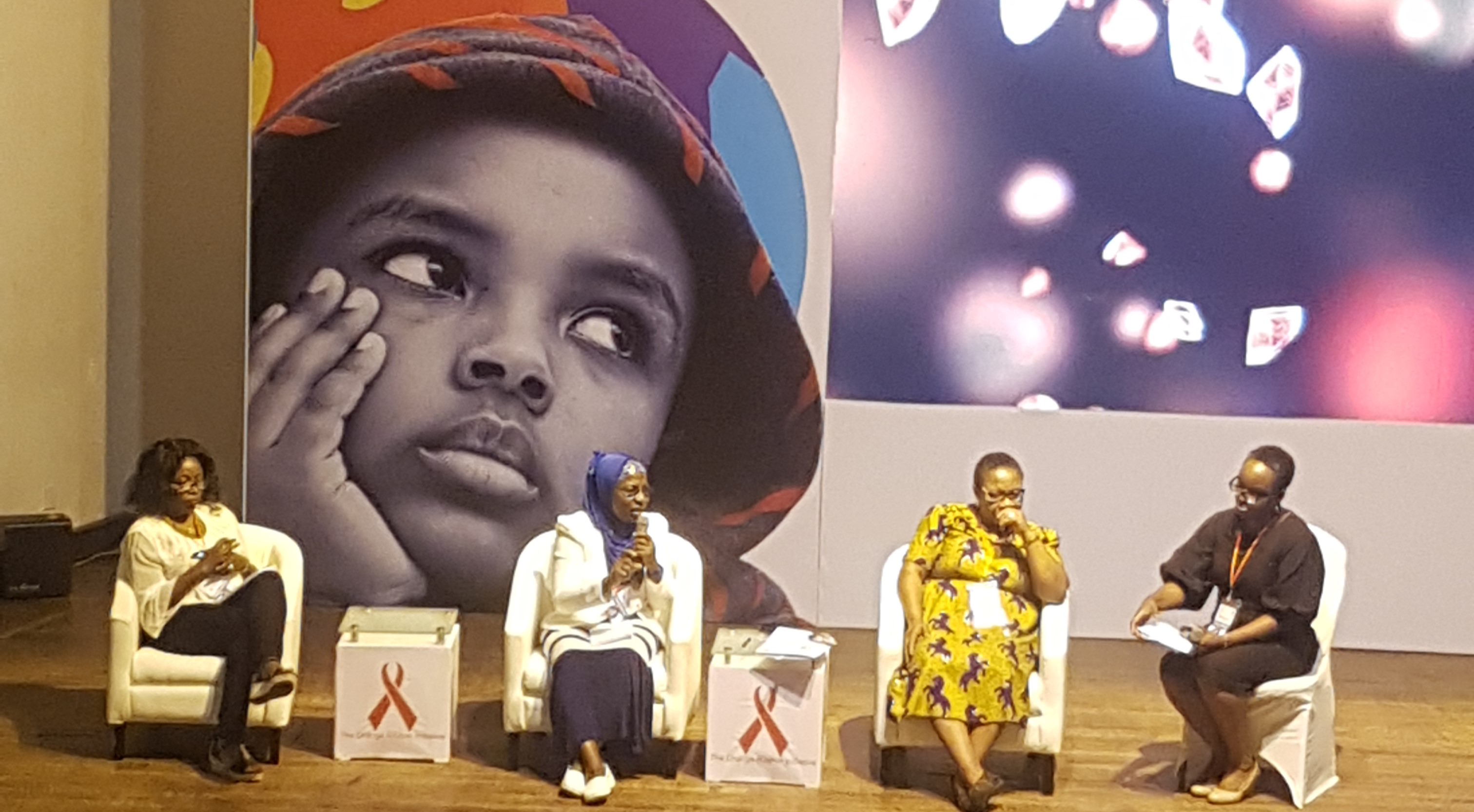The annual autism conference, a brain child of Africa’s foremost financial institution, Guaranty Trust Bank, kicked off to a great start on Tuesday Ju
The annual autism conference, a brain child of Africa’s foremost financial institution, Guaranty Trust Bank, kicked off to a great start on Tuesday July 30th 2019 at the Muson Centre, Lagos, with facilitators and participants made up of healthcare professionals, care givers, teachers and founders of specialized schools for children living with Autism Spectrum Disorders (ASD) as well as parents of children with living with autism and members of the public.
Having made significant impact in creating awareness since the inception of the conference, nine years ago – with nearly 4000 children benefiting from one on one consultations services; 15,000 people trained on how to manage autism and 12,000 people including parents of autistic children participating in the annual conference – it became imperative to move the conversation to the next level, beyond mere diagnosis.
With children living with autism, often unable to move past the stigma they face and finding it difficult to get the necessary skills and support necessary for an independent and productive adolescent to adult life, GT Bank thought it necessary to have this year’s conference focus in the direction of helping children living with ASD to move successfully from one phase of their life to another, achieve their maximum potential in life and live a life of purpose. Hence the theme of this year’s conference aptly tagged, ‘Autism: Transitions, Vocational Skills and the role of Technology’.
The conference catered to two groups of people; medical professionals/care givers and parents/people curious about Autism Spectrum Disorder. Besides helping to increase greater societal awareness on Autism Spectrum Disorder, the latter group got improved knowledge of the care children with ASD should receive, the importance of inclusivity in the quality of education they get, transition planning in the type and quality of health care they receive as well. The transition planning also covers schooling, work, getting the right work environment, adulthood, right services their age requires, and pro-actively anticipating these things and attending to them.
The second group which consisted of medical professionals, care givers, education providers and a sprinkle of parents who also double as the first three group of people, focused on managing autism across life span as well research and intervention skills. In her first presentation, Dr Mashudat Bello-Mojeed a consultant psychiatrist and a public health physician, spoke about using technology interface in ASD management. As it is well known, speech and communication is one major area children with ASD have difficulty with. And so, Bello-Mojeed dwelt heavily on the practical and functional forms of communication using both sign language and technological tools such as smart phones and Ipads. According to her, not only are these tools engaging, they provide longer span attention, higher interest especially if apps that are customizable and address specific needs are installed.
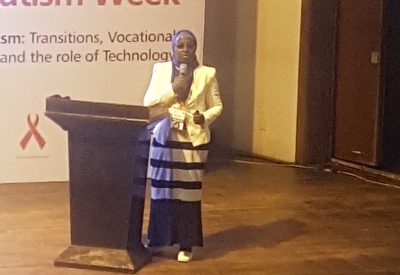
Dr Mashudat Bello-Mojeed
Dr Nkiruka Aseogwu, a lecturer at the university of Lagos and consultant otorhinolaryngologic at the Lagos University Teaching Hospital, LUTH, in her presentation spoke about using Auditory Brainstem Response, ABR, a powerful, noninvasive method used to assess the cochlear nerve and auditory pathways of the brain stem, to diagnose Attention Deficit Diagnosis, ADD, a neurobehavioral developmental disorder characterized by lack of sustained attention and hyperactivity which is common in children living with ASD. Using electrodes placed on the scalp, one is able to detect through measured recording, a series of six to seven vertex positive waves to determine the extent of a child living with ASD’s attention span and how treatment or therapy should go.
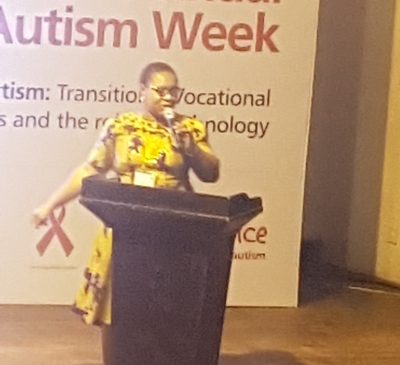
Dr Nkiruka Aseogwu
Dr Yetunde Adeniyi, a lecturer in the department of psychiatry, College of Medicine and the centre for child and adolescent mental health, University of Ibadan, centred her presentation on the use of cannabis oil in autism management. A widely used plant and present in every country of the world, cannabis is considered one of the most widely used recreational drugs today. According to Dr Adeniyi, cannabis helps to regulate emotional response in children living with ASD and also how it regulates seizures, anxiety, cognitive impairments and sleep pattern disturbances. She was however quick to add that local marijuana isn’t quite the same as cannabis oil as the latter has undergone some processing.
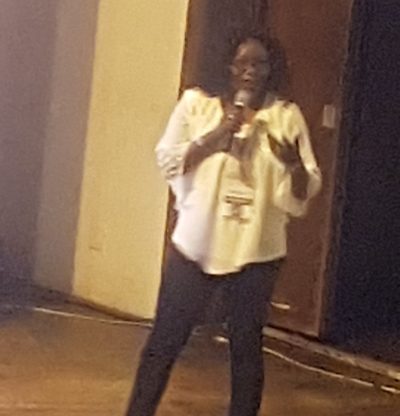
Dr Yetunde Adeniyi
Following the question and answer session moderated by Dr Yewande Oshodi, a consultant psychiatrist and senior lecturer in the department of psychiatry of the Lagos University Teaching Hospital and College of medicine, University of Lagos, was a parents breakout session for a Picture Exchange Communications Systems, PECS, discussion. PECS as explained, allows people with little or no communication abilities to communicate using pictures. A unique alternative/augmentative communication system, children living with ASD are taught to communicate without relying on speech.
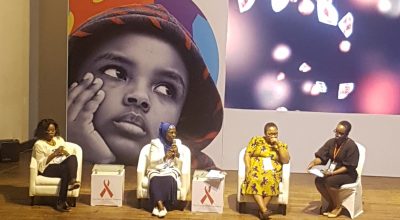
Ist right, Dr Yewande Oshodi moderating the question and answer session
They are taught to approach another person and give them a picture of a desired item in exchange for that item. This session had Camille Proctor (ED, founder of The Color of Autism Foundation), Dr Grace Ojeamiren-Bamigboye (a certified consultant speech-language pathologist), Ajibike Bakare (lawyer and educator) on the panel and Dr Enweremadu-Burns (president and founder of ABE international clinic and consultancy), as head panelist. These group of people took their time to explain the use and benefits of PECS and why it should be incorporated in the lives of children living with ASD.
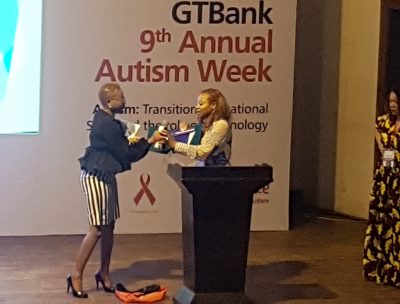
Ajibike Bakare, Dr Enweremadu-Burns and Camille Proctor
demonstrating at the PECS session
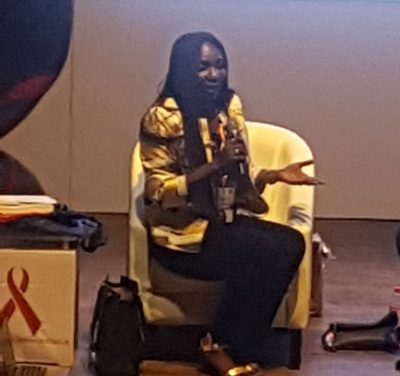
Dr Grace Ojeamiren-Bamigboye answering a question during the PECS session
The first day ended with more panel discussions on autism and mental health as well communication and sensory overload with both Dr Noimot Balogun, founder and director of programmes at Linka.NG moderating on the former and Rhoda Odigbo, Director, Academics, Bridge Nigeria, moderating the latter panel.
The second day, Wednesday July 31st continued with more talks on how to handle children just newly diagnosed with Autsim (Dr Enweremadu-Burns); how to maneuver the pitfalls in managing an autistic child and not get overwhelmed (Remi Olutimayin, Founding partner of Robufeed, an educational tools design company) and how that in this age of technological advancement, children living with autism are as much qualified to be in that field as anyone else, if well guided. This session was handled by (Jeanette Washngton, a speech and language pathologist).
Rounding up the second day was a panel on parents’ discussion on how children living with autism can affect the family and how the family can in turn live through it. It was moderated by Camile Proctor while Ajibike Bakare moderated the panel on Out-of-school programmes that can help autistic children. Programes revolving art, music, as well as other vocation in ASD management.
Even though the two-day event which was all talk has ended, parents who have chidren living with autism have been presented with an opportunity to bring their children for one-on -on consultaions with specialiss for assessment of their conditions as well as a follow-up. The behavioural clinic which also includes adults flagged off today, Thursday 1st of August at the Digital Village, Alausa, Lagos and will continue to Wednesday August 6th. The consultation session will include but not limited to; speech therapy, occupational therapy, clinical psychology, developmental psychiatry, parent counselling, behavior analysis etc.
Guaranty Trust Bank plc is a Nigerian financial institution that has maintained a defined Corporate Social Responsibility (CSR) strategy since its inception in 1990. The Bank actively supports numerous programmes across Africa that positively affect Infant and Maternal Healthcare, Education, the Arts, Community Development and the Environment.
